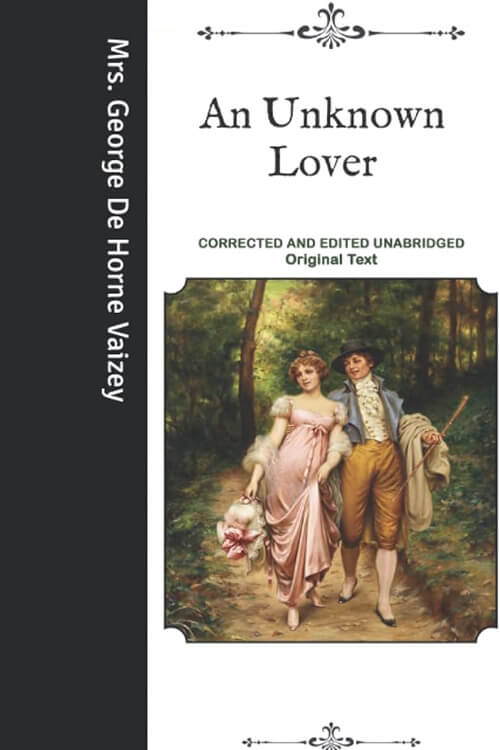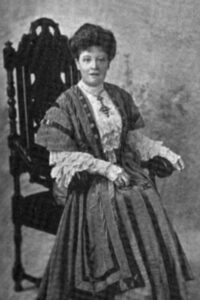
An Unknown Lover
They were seated together at the breakfast table, a handsome, bored-looking man of thirty-three, and a girl of twenty-six, whose dress of a rich blue made an admirable touch of color in the dim, brown room.
The house had been designed in the period when shelter from the wind seemed to have been the one desired good and was therefore built in a dell, from which the garden rose in a rapid slope. Today the house would crown the head of the slope, and the dell be relegated to a retreat for occasional hot afternoons; the breakfast room would face east, and the sun stream in through wide bay windows, from which fact the spirits of the occupants would benefit afresh with each new morn. As it was the light filtered dimly through mullioned panes, and the oak-panelled walls gave back no answering gleam. Curtains and carpet alike were of dull neutral tints, and the one bright spot in the picture was the blue dress of the girl, who sat behind the coffee urn.
Was she beautiful? Was she merely pretty? Was she redeemed from plainness only by a certain quality of interest and charm? At different times an affirmative answer might have been given to each of the three questions in turns; at the moment Katrine Beverley appeared just a tall, graceful girl who arranged her hair with a fine eye for the exigencies of an irregular profile, and who deserved an order of merit for choosing a dress at once so simple, so artistic, and so becoming.
Martin was enjoying a breakfast menu which he sturdily refused to vary. Year in, year out, through dog days, and frost, the same three courses formed his morning meal. Porridge—the which he ate barbarously with sugar, instead of salt,—bacon and eggs, marmalade, and toast. The appearance of the same dish at the dinner table twice over in a fortnight would have evoked complaints and reprisals, but he would stand no tampering with his breakfast. The Times and the Morning Post lay beside his plate. He glanced at the headlines in the interval between porridge and bacon. Nothing going on! It was the dullest of all dead years.
Katrine was nibbling daintily at fruit and cream. For the moment a fruitarian craze was in full swing, and she shuddered disgustedly at the thought of bacon, refusing to view it in its crisp and rashered form, and obstinately harking back to the sty. In a few months, she would probably be discoursing learnedly of the uric acid in fruit, and seriously contemplating a course of “Salisbury.”
Read or download Book
Mrs George de Horne Vaizey
Jessie Bell (1857 – 23 January 1917), later Jessie Mansergh, was an English writer born in Liverpool, who wrote under her married name Mrs George de Horne Vaizey. De Horne Vaizey was the daughter of Scottish insurance broker David Bell, and his wife, Elizabeth Morris Barton, and had six siblings, four brothers and two sisters.
Biography.
She married Henry Mansergh, a cotton broker, in 1883. They had a daughter, Gwyneth Alice, in 1886. She met her second husband, George de Horne Vaizey, on a Mediterranean cruise, which she won in a short story competition. Her son, named George after his father, also became a writer.
As her biography at Athelstane Books notes, “She often used her own varied experiences in her books. She used situations from her early life in a large family, her first husband’s addiction and death, and her illnesses in her novels.” De Horne Vaizey’s daughter Gwyneth, nicknamed Kit, was the inspiration for the character Kitty in her 1902 work “A Houseful of Girls”. The author mentions that Gwyneth did share lessons with a family of five sisters, who “in many ways were like the book Rendells. Christabel is as like as I could make her and they all talk In that funny way, emphasizing every second or third word. De Horne Vaizey was an invalid for many years before her death. The Sydney Morning Herald obituary mentions that she had been “an invalid, crippled and confined to her bed for years”.
De Horne Vaizey was quoted in Housekeeper magazine in 1909 on the differences between men and women, saying: “I’m convinced that men would be smaller-minded still if they were in our place, so it’s not as big as it seems. It’s our life’s work to do the small things, to save the small sums, and haggle over pennies, while men deal with the great affairs of life.”






